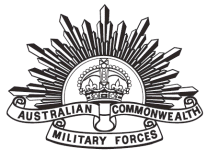

| Regimental number | 67 |
| Place of birth | Tramore, Waterford, Ireland |
| Religion | Roman Catholic |
| Occupation | Ship's fireman |
| Address | Sailors Rest, Fremantle, Western Australia |
| Marital status | Single |
| Age at embarkation | 26 |
| Height | 5' 8" |
| Weight | 133 lbs |
| Next of kin | Sister, Minnie Hannigan, Tramore, Waterford, Ireland |
| Previous military service | Nil |
| Enlistment date | |
| Place of enlistment | Helena Vale, Western Australia |
| Rank on enlistment | Private |
| Unit name | 16th Battalion, C Company |
| AWM Embarkation Roll number | 23/33/1 |
| Embarkation details | Unit embarked from Melbourne, Victoria, on board HMAT A40 Ceramic on |
| Rank from Nominal Roll | Private |
| Unit from Nominal Roll | 16th Battalion |
| Fate | Returned to Australia |
| Age at death from cemetery records | 30 |
| Place of burial | Fremantle Cemetery (Portion Roman Catholic, Plot CC, Grave No. 613), Western Australia |
| Panel number, Roll of Honour, Australian War Memorial | 79 |
| Miscellaneous information from cemetery records | Discharged 14/07/1916, due to Service. Son of Thos. HANNIGAN. Native of Tramore, Waterford, Ireland |
| Other details |
War service: Egypt, Gallipoli Admitted to hospital, Gallipoli, 8 August 1915 (gun shot wound, lung); disembarked from HS 'Valdivia' and admitted to Cottonera Hospital, Malta, 20 August 1915; transferred to HS 'Galeka' and proceeded to England for further treatment, 25 August 1915; admitted to College Hospital, Chelsea, 3 September 1915 (crushed chest). Embarked Portland and commenced return to Australia on HS 'Runic', 7 November 1915; disembarked Fremantle, 21 December 1915. Discharged on account of being unfit for continued military service, Perth, 14 July 1916. Died after discharge, Fremantle, 12 December 1916. Medals: 1914-15 Star, British War Medal, Victory Medal. Published obituary in the Camp Chronicle entitled 'The death of Hannigan: A hero and a soldier' reads: Thousands who knew not Private Hannigan personally knew him through the pages of the "Camp Chronicle," and it is with deep regret that we have to announce the death which took place at No.8 General Hospital at 7 p.m. on Tuesday [12 December 1916]. Hannigan - "Paddy," as he was called by his pals, and he had hundreds - was a native of Tramore, Ireland, and early in life took to the sea. He was well known in Cardiff (South Wales). After his discharge he took to the sea once more and was engaged on the boats trading to North West ports from Fremantle. All along the coast Hannigan was well known. On the outbreak of war he was one of the first to enlist and one of the first to leave as Bn stretcher bearer. He was at the landing of Gallipoli and was recognised as one of the bravest men there, being mentioned four times in despatches. Thin, slim, but wiry as they make them, he performed prodigies of valour, and many a man alive to-day owes it to Paddy's energy, fore-thought and courage. Returned men again and again tell of his deeds, but Hannigan never spoke of them and disliked their being mentioned. One instance we might mention. In May last a soldier minus a leg returned from the front, and on arrival at No.8 General Hospital asked for Hannigan. He was shown into "G" Ward, and there lay Hannigan. The maimed man made for his bed, and embraced Hannigan, the while tears streamed down his cheeks. Turning to the rest of the patients he said: "Paddy here carried me two miles on his back wit my leg shattered and all to pieces, and the shells were bursting round. "Twas a hot corner. We had to stop and lie low, and I wanted him to leave me, but he got me in all right." This is only one of the many tales of heroism. Hannigan was severely injured several times, and buried twice. He returned to Australia in December last year, and it was at once seen that his lungs were terribly affected, and the medical men gave him only a few months to live. He bore up well and took his fate as a Stoic and brave man would. He was full of native wit. In Fremantle he was deservedly popular with one and all, and became one of the port's identities. Of late he failed quickly, and on Saturday was so ill that he entered the Base Hospital once more. A representative of the "Chronicle" saw him only a few hours before he died; and he knew well his passing was near, but was cheerful as ever, had a joke ready and asked that he be remembered to all who knew him. "Tell them to buck up and tell the boys to join, because we must win the war," said Hannigan. As evidence of his thoughtfulness, one of his oldest friends was Mr. Button, of the Spring Park Hotel, "but," said Hannigan, "don't tell him I'm dying, because it will only make him think of his son's death." Such a man as Hannigan was compounded of the stuff of which heroes are made. He was always kindly, always a gentleman in the best sense of the word. He will be much missed but long remembered. Of him may it be truly said, "He did his bit." And now may he rest in peace. Hannigan is gone, but the spirit of Hannigan lives on, and will still live. West Australians may well be proud to remember that he served with them." |
| Date of death |